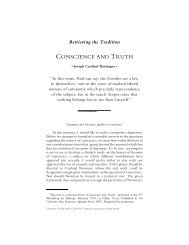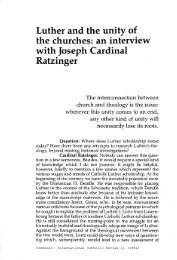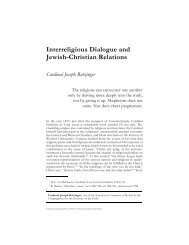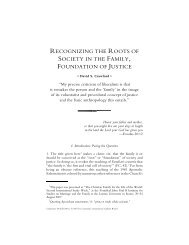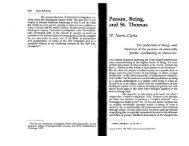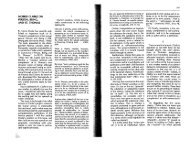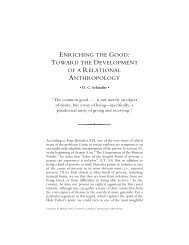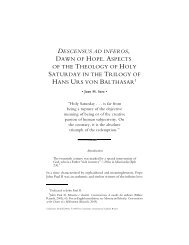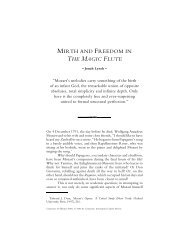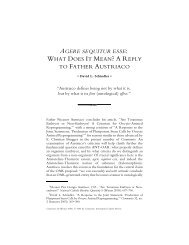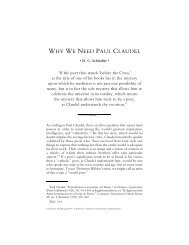Juan Sara. Secular Institutes According to Hans Urs ... - Communio
Juan Sara. Secular Institutes According to Hans Urs ... - Communio
Juan Sara. Secular Institutes According to Hans Urs ... - Communio
You also want an ePaper? Increase the reach of your titles
YUMPU automatically turns print PDFs into web optimized ePapers that Google loves.
39 Balthasar, My Work in Retrospect, 58.<br />
40 Ibid., 20.<br />
<strong>Secular</strong> <strong>Institutes</strong> 325<br />
shape in the “secular institutes.” For these as a structure are<br />
beyond doubt the unifying midpoint of the Church. 39<br />
Unfolding<br />
When Balthasar speaks of the “closest possible following of<br />
Christ,” he is speaking of an obedience (Ignatius) of love (John): “In<br />
my view, all that is decisive takes place in the spiritual space that lies<br />
between the two poles of John and Ignatius.” 40 What is at stake, in<br />
other words, is a loving disponibility (fiat). This disponibility is the<br />
center both of the consecrated life and of each of the three parts of<br />
the Trilogy, for it is the central attitude of Christ himself—the<br />
attitude by means of which he brings <strong>to</strong> completion the Father’s<br />
creation. Obedience is the real, incarnate, concrete mode in which<br />
love is expressed and so realized. It is thus the center of the<br />
transcendentals and the power that sustains their unfolding—and, for<br />
the same reason, the center of Christian life itself.<br />
The contemplation of Christ’s original consecration <strong>to</strong> the<br />
Father brings <strong>to</strong> fruition the creature’s response—a response of <strong>to</strong>tal<br />
self-donation. The contemplative is one called, marked, consecrated,<br />
and blessed, who truly forgets himself, goes out of himself,<br />
distributes the gift he has received, and shares his very self. He is one<br />
who communicates overflowingly, who gives <strong>to</strong> others with ever<br />
greater generosity, because he himself receives, and giving and<br />
receiving are one and, in their unity, infinite: Benedixit—<br />
fregit—diditque. Working in the Lord’s consecration, he is a<br />
collabora<strong>to</strong>r of the truth who unveils, <strong>to</strong>gether with Him, the love<br />
of the Father that anticipates every thought, who shares in realizing<br />
the truth of God and the world.<br />
The unfolding of the Christian life, of which the consecrated<br />
is but a condensation in the act of service, and the unfolding of the<br />
transcendentals, are co-extensive. The center of each of the<br />
transcendentals in the Trilogy occurs in Christ’s obedience of love,<br />
which takes within itself, out of pure grace, the creature’s response<br />
<strong>to</strong> God. This attitude opens up both the Being of God and the being<br />
of the world. Obedience is the Yes that perceives and brings <strong>to</strong> light



